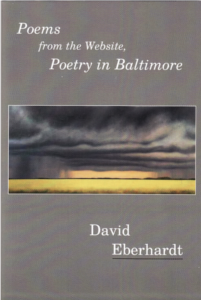Summer 2012
Table of Contents - Vol. VIII, No. 2
Poetry Fiction Translations Reviews
Dan Cuddy
David Eberhardt,
Poems from the Website, Poetry in Baltimore, ISBN 978-0982185421, Loch Raven Press, 2011, 58 pages, $14.95.
Writing a review of David Eberhardt’s third book of poetry is difficult in many ways for me. I do have to state the obvious disclaimers: yes, this book is published by the Loch Raven Press which also publishes the Loch Raven Review. Yes, I co-authored an article with him that appeared in this magazine about the recent history of the Baltimore Poetry scene. Yes, I know him. Yes, I’m not unbiased. However, reviewing his book has made me really discover him as a poet. What I want to do is to introduce his work to those who next to nothing about him, though if you have read the Loch Raven Review over the past few years, you had to come across his writing, poetry and prose. In the Spring 2012 issue you can find a fragment of a memoir that he is writing.
I think the best way to discuss David Eberhardt as a poet is to discuss what and who he is not. He is not Ted Kooser. He doesn’t write poetry from what Towson University poet and professor Harvey Lilywhite once called “the midwest of the mind”. Eberhardt doesn’t write raw, uncooked Beat concoctions. He is not a “poseur”. He isn’t John Ashbery attempting to say as little as possible with as many words as conceivable. David Eberhardt’s poetry is not designed to be a blank wall that illustrates the limits of communication. He is not a traditionalist glued to a tradition of dry cracking forms or an anarchist pulling rabbits out of the magic of his head. He is too white, too male, too old, too Scotch and German to be ethnic and in fashion. Yes, he is a political activist, a militant man of peace, but he is one who acts, not just one who speaks and talks a good game. Yes, he is a cosmopolitan who embraces diversity. Yes, he isn’t opposed to the new, the unfamiliar.
Well, who is he? I thought I knew him as a poet but I found that I didn’t. His work, at times, can appear rather opaque. Twenty years ago that would have been the death knell for some of his poems, but thanks to the internet there are few allusions that can’t be tracked down. These allusions can be found on Wikipedia for one:
The Rwenzori Mountains, previously called the Ruwenzori Range
The Ruwenzori Mountains are mentioned in the poem Great Apes. The quarries of Ripton Vermont are another perhaps obscure allusion in At the Tomb of Poe, a Sonnet. What makes the town even more interesting than a source of a particular type of stone is that the Bread Loaf Writers’ Conference is held annually in Ripton, Vermont. That brings up another point about Eberhardt’s allusions. The poet has a sense of humor. The poet even makes things up sometimes for expressive purposes like the Constellation Eeyore in the poem of that name mourning and celebrating another Baltimore original, the late David Franks. In his work the proper names of people, places, plants, and animals aren’t chosen willy nilly but have an associative function. Humor is a definite part of this poet’s repertoire. That must always be kept in mind. A reader can’t be doctorate-serious about Eberhardt’s every word. The man is a showman. However, the poet is also a scholarly enthusiast of often arcane or little known facts.
David Eberhardt is a visionary. He is often like the William Blake of The Marriage of Heaven and Hell. The idiom, the form of the poem, perhaps even the point of view is original. No, the cursory reader isn’t going to appreciate Eberhardt’s finer points, but the discerning one will find experiments in form, structure and voice. Often the poems require attention to details. Sometimes the meaning of particular phrases doesn’t give itself up readily, but it isn’t because the words aren’t articulating an idea or an emotion. Sometimes they just display a wonderful linguistic friction that produces sparks of irrational illumination to those attuned to such subtlety. Don’t all poems communicate this way? Most poems don’t. Most poets don’t experiment as pervasively with their mode of writing. Most poets do not have the breadth of knowledge and interest that Eberhardt has; do not have the exotic vocabulary. His interests range from botany to the American Civil War. He writes haiku and villanelles and poems that are commentaries. He writes about Golgotha, the Crucifixion, Harry Potter, serial killers Jeffrey Dahmer, “Theodore” Bundy. He writes about the large Hadron Collider beneath the French-Swiss border, about Hart Crane’s suicide, about local Baltimore poetry scene figures. Eberhardt is unpredictable. He plays with language like children play with food. However, there are some constants. He is adamantly against violence, exploitation and the greatest of exploitation and violence: war. He has a feel for art. He has compassion for humanity, and, most important for a poet, he can express his feelings. Witness these six lines from the poem “Villanelle” from the Haiku:
Her hand as I held it---a surprise, the steady pace---
Like an eclipse, much faster, then her body carted off on
A tray---mere rag headed to cin-
der, but then---consolat-
Ion---calm as if in Vermeer’s paintings---it sinks in!
As the lines above illustrate there are great rewards for contending with the idiosyncrasies that the language sometimes presents. Cummings, Eliot, Lawrence Sterne, Joyce are no different. Eberhardt’s use of language is in their tradition plus the use of the American vernacular. And always, always the reader must be aware of the playfulness of the poet.
Tissue to be folded or bunched?
The flavor
of green tea over rice
the roiling bowl,
squirrels fighting
in the mulberry tree
Even if the reader has no appreciation for bathroom humor the imagery, the leaps of the imagination, have to impress anyone who has a feel for poetry.
An important footnote: The title of this book is “Poems from the Website, Poetry in Baltimore”. Eberhardt is a is almost a daily contributor to the site. All of the poems in the book have appeared there. Not all the poets who frequent the Poetry in Baltimore (PIB) are as talented or have the serious vision that he often displays, but it is one of the more interesting web forums devoted to poetry. The book is a celebration of PIB as well as the display of one writer’s art.
© Dan Cuddy

